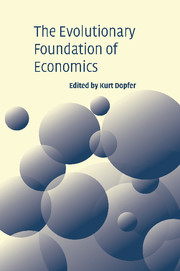Book contents
- Frontmatter
- Contents
- List of contributors
- List of figures
- List of tables
- Prolegomenon
- I Ontological foundations
- II A framework for evolutionary analysis
- 8 Towards an evolutionary theory of production
- 9 Learning in evolutionary environments
- 10 The evolutionary perspective on organizational change and the theory of the firm
- 11 The self-organizational perspective on economic evolution: a unifying paradigm
- 12 Evolutionary concepts in relation to evolutionary economics
- 13 Understanding social and economic systems as evolutionary complex systems
- 14 Perspectives on technological evolution
- 15 Evolutionary economic dynamics: persistent cycles, disruptive technology and the trade-off between stability and complexity
- 16 Evolutionary theorizing on economic growth
- Index of topics
- Index of names
- References
13 - Understanding social and economic systems as evolutionary complex systems
Published online by Cambridge University Press: 22 September 2009
- Frontmatter
- Contents
- List of contributors
- List of figures
- List of tables
- Prolegomenon
- I Ontological foundations
- II A framework for evolutionary analysis
- 8 Towards an evolutionary theory of production
- 9 Learning in evolutionary environments
- 10 The evolutionary perspective on organizational change and the theory of the firm
- 11 The self-organizational perspective on economic evolution: a unifying paradigm
- 12 Evolutionary concepts in relation to evolutionary economics
- 13 Understanding social and economic systems as evolutionary complex systems
- 14 Perspectives on technological evolution
- 15 Evolutionary economic dynamics: persistent cycles, disruptive technology and the trade-off between stability and complexity
- 16 Evolutionary theorizing on economic growth
- Index of topics
- Index of names
- References
Summary
Introduction
This chapter sets out a view of social and economic systems as being a constituent part of a set of evolving, multi-scale spatio-temporal structures. The complexity of these structures means that the decisions taken by any particular actor or agent will necessarily be taken under considerable uncertainty, and this uncertainty will be further compounded for everyone by the interacting effects of whatever decisions the actors or agents take. Each individual, group, firm, corporation, shareholder and even observer experiences ‘path-dependent learning’, whereby learning in a given period is conditional on the decisions taken, and therefore in the next period the options considered and the problems posed are changed by what happened in the previous period. This gives rise, for the system of multiple agents and actors, to a divergent evolution of multiple behavioural ‘conjectures’ and ‘experiments’, some of which will turn out to be fruitful, and others fruitless. The spreading patterns of behaviour are narrowed by the differential selection of success and failure, and, broadly speaking, success goes to those evolutionary trajectories that find self-reinforcement in their environment, instead of either indifference or hostility.
A mathematical representation of these phenomena is presented, showing how human systems are characterized by the simultaneous operation at multiple levels of this combined exploratory and self-reinforcing behaviour. In economic systems, the actual products and services offered to customers are characterized by the trade-offs between the attributes that any technological concept can attain.
- Type
- Chapter
- Information
- The Evolutionary Foundations of Economics , pp. 431 - 458Publisher: Cambridge University PressPrint publication year: 2005
References
- 4
- Cited by



